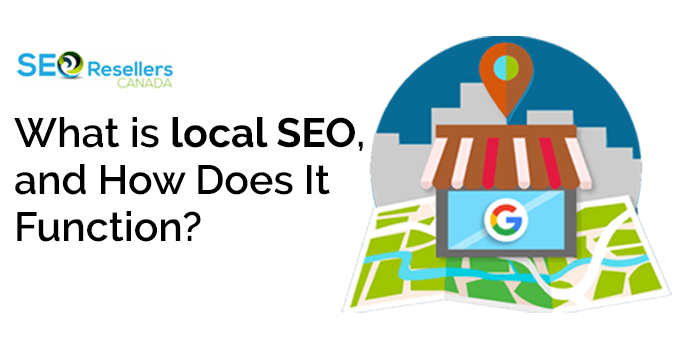You need a unique domain name to craft your online identity. It is like your digital fingerprint that people will use to remember you. There are different domain extensions like .com, .ca, or .uk. They’re like the finishing touch to your website’s name, and each one has a unique purpose.
Your domain extension can do more than you think! It’s not just about looking cool. With the help of the right domain name, your Link building company can present your brand to the right crowd. Imagine you’re a local business in Canada – going for .ca is like telling your customers, “Hey, I’m right here, in your neighborhood, ready to serve you!” Country-specific domain names perform better on Google.
These localized extensions make it easy for white-label SEO specialists to target your specific country. You won’t have to jump through hoops or rely on confusing tech stuff. Your website speaks the local language from the get-go! So, if you’re aiming to win over the hearts of your local audience, snag that perfect domain.
1- Customers Form Opinions Based on Domain Extension

Domain extensions like .ca are easy to recognize. These domains are a stamp of authenticity for the website and business. This authenticity becomes particularly crucial when you’re opting for SEO outsourcing and expecting higher ROI. Trust in the audience is very important in SEO, especially in the world of e-commerce.
When your website sports a geographic extension like .ca, it works for local search engine results. These country-specific extensions guide search engines precisely where to look, boosting your chances of being found by local users. In Canada, for instance, having a .ca domain can do wonders for your SEO rankings. Why? Customers tend to form positive opinions about your website’s shipping terms and conditions, enhancing their overall trust in your business.
Interestingly, an article on Ahrefs delved into a similar topic of website authority with domain extensions. Perception holds true even for businesses aiming to target local markets. Having a .ca domain is more than a digital address. It is a statement that a digital marketing agency can leverage to communicate with your audience. It instills confidence in your ability to handle their requests with expertise and finesse.
2- .ccTLDsAre Easier to Identify
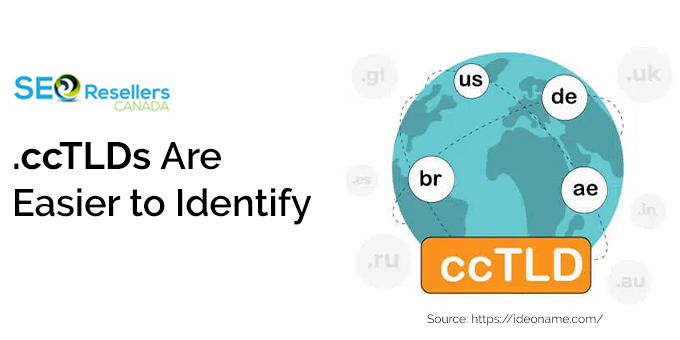
Meaningful .com domain names are limited. That’s where opting for the .ca extension proves to be a savvy move. It enables you to carve out a niche that speaks directly to your domain-specific audience.
Where billions of websites exist, the .ca domain helps you blend into the vast online landscape and create a unique presence. .ca doesn’t mean compromising; it offers a distinctive identity for your business.
Additionally, embracing the .ca extension offers more than just a catchy domain name. It provides your business with an extra layer of protection against the fierce competition posed by numerous .com websites. This way, you’re safeguarding your online presence and ensuring that your business stands strong amid the digital onslaught.
3- .CA vs . COM?
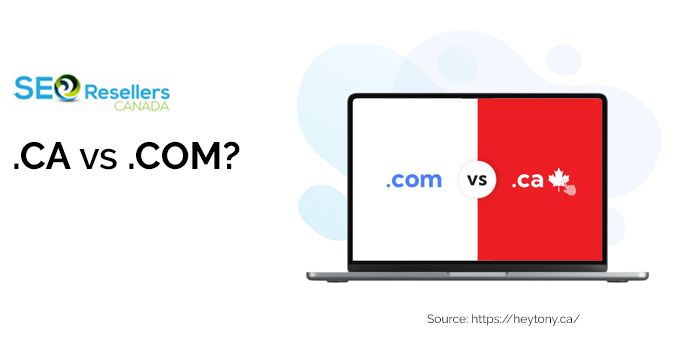
The distinction between a .ca and a .com domain can impact your brand in a big way. It plays a crucial role in your website’s SEO. Thus, SEO consulting is essential based on your industry and long-term business objectives.
3.1- .ca Domain Benefits
A .ca domain signifies a strong Canadian presence, enhancing trust among local customers. It boosts local search engine rankings and offers higher visibility in Canada. Canadians prefer .ca websites for local services. It helps in credibility and customer loyalty within the country.
3.2- .com Domain Benefits
A .com domain offers universal recognition, and it is ideal for international businesses. It signifies a global presence that appeals to a broader audience. .com domains are widely trusted because they come with credibility and familiarity worldwide. They are versatile and cater to various businesses and organizations across different industries.
4- The perfect choice for Kelowna SEO
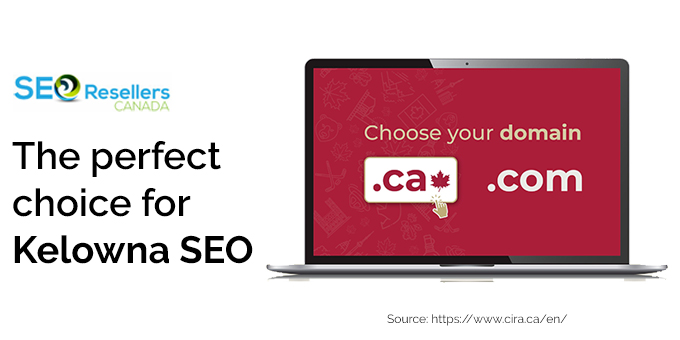
Securing both the .com and .ca extensions for your domain is a wise investment. These are often priced at less than $15 per year. This nominal cost provides exceptional value. It also protects your brand from potential misuse.
You can instruct your Webmaster to set up a 301 redirect from one domain to the other. This strategic move not only ensures that your audience reaches your website, regardless of the domain they type but also offers SEO advantages.
Each redirect generates valuable ‘link juice,’ contributing to an improved ranking in Google search results. With the latest data reinforcing the significance of these redirects, it’s a cost-effective strategy to enhance your online visibility and protect your brand identity effectively.
5- How do you redirect a .com domain to a .ca domain?
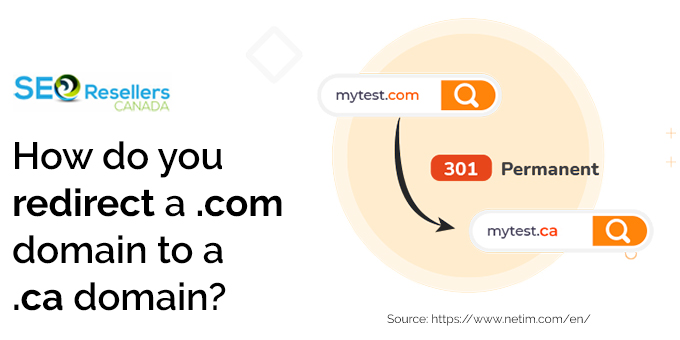
Redirecting your .com domain to a .ca domain is a straightforward process. Hire a Victoria SEO company or do it by yourself by following the below steps.
- 1. Access your Domain Registrar: Log in to your domain registrar’s website where your .com domain is registered.
- 2. Locate Domain Settings: Find the domain management or settings section in your account dashboard.
- 3. Set up a 301 Redirect: Look for options like “Domain Forwarding” or “URL Forwarding.” Choose the 301 permanent redirect option.
- 4. Enter the .ca Domain: Enter your .ca domain URL in the provided field. This tells the .com domain to redirect all traffic to the .ca domain.
- 5. Save Changes: Save your settings. The .com domain will now automatically redirect visitors to the corresponding .ca domain.
6- Ca Vs. Com based on your target market
The correct top-level domain (TLD) is important when you are catering to Canadian customers. Opting for the .ca extension offers localized geo-targeting benefits in search engines. When users utilize Google.ca instead of Google.com, search results prioritize .ca web addresses. It works exactly the way social media solutions utilize the algorithms to enhance your visibility among the local audience.
When your business aims to serve customers in the USA and beyond, the .com TLD is the preferred choice. .com domain is widely recognized, and it carries a universal appeal. People often associate this TLD with local services despite the awareness that .ca represents Canada.
7- What Do You Want Google Webmasters to Think?

In the realm of domain extensions, your choice between .ca and .com holds significant weight. By default, Google Webmaster views .com sites as international, but you can signal your Canadian association, enhancing local search traffic. Engaging an SEO consultant can streamline this process, ensuring your website aligns with your geographical focus and business goals.
8- TLD Competition Overall
When it comes to domain name competition, .com domains vastly outnumber .ca domains. Therefore, if you’re aiming for localized search terms, .ca addresses provide a better chance of being discovered. The familiarity and preference for .ca within certain niches also contribute to its effectiveness in engaging specific target markets.
9- Consider Your Target Market Stereotypes

Understanding consumer preferences is crucial, as it impacts bounce rates, user engagement, and conversions. Different generations perceive domain extensions differently. While some might not discern between .ca and .com, others, especially loyal market segments, favor the local touch of .ca. Assess your target audience’s traits, considering their perceptions regarding Canada and global businesses.
10- Where Are Your Back Links Coming from?
The origin of your backlinks significantly influences your website’s search results. If most backlinks are .ca addresses, your site gains favor in local search results. To expand beyond local boundaries, cultivating backlinks from .com domains becomes essential. Strategic link-building efforts can bridge the gap between local and international visibility.
11- So, What’s the Difference Between Country code top-level domain (ccTLD) and Generic top-level domain (gTLD)?
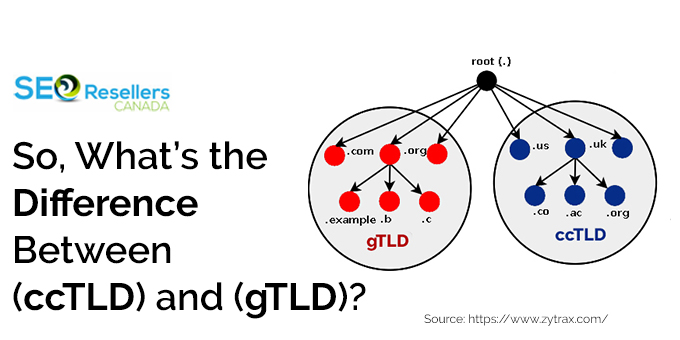
Country code top-level domains (ccTLDs) are specific to individual countries or territories, such as .ca for Canada or .uk for the United Kingdom. They indicate the geographical origin of a website and often boost local search engine rankings. On the other hand, generic top-level domains (gTLDs) like .com or .org are more universal and not tied to a specific country. They are widely used and recognized globally and are suitable for international businesses and organizations.
12- Which domain extension is better for SEO?
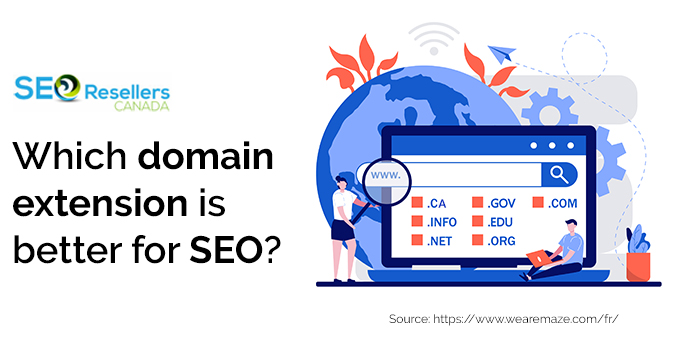
The choice of your top-level domain profoundly impacts your SEO success. A country-specific domain like .ca provides an advantage in local search results due to its association with Canada. When users search locally, .ca websites are favored, ensuring your business resonates with the intended audience. Careful consideration of your domain extension ensures your website ranks effectively and attracts the right traffic.
Here’s a breakdown of which domain extensions work best for specific SEO needs:
Local SEO:
- For businesses focusing on specific neighborhoods or regions, a country-specific domain like .ca provides a local advantage.
- Local search results favor .ca websites, ensuring your business connects effectively with local customers.
International SEO:
- If your business aims to attract a global audience, generic top-level domains like .com can enhance international visibility.
- .com domains are widely recognized and preferred in international search results, catering to a broader customer base.
Canadian SEO:
- To target Canadian customers specifically, a .ca domain signifies a strong Canadian presence, gaining trust and credibility.
- Canadians often prefer .ca websites for local services, making it a favorable choice for businesses within the country.
- Carefully selecting your domain extension based on these SEO considerations can significantly impact your online visibility and audience engagement.
13- Best domain extension for businesses
13.1- .ca Domain for Canadian Businesses
For businesses operating exclusively in Canada, the .ca domain extension is ideal. It signals a strong local presence, building trust among Canadian customers. Local search engines prioritize .ca websites, ensuring higher visibility within the country. This domain establishes credibility, showing that your business caters specifically to the Canadian market, enhancing brand loyalty and customer confidence.For businesses operating exclusively in Canada, the .ca domain extension is ideal. It signals a strong local presence, building trust among Canadian customers. Local search engines prioritize .ca websites, ensuring higher visibility within the country. This domain establishes credibility, showing that your business caters specifically to the Canadian market, enhancing brand loyalty and customer confidence.
13.2- .com Domain for International Businesses
For businesses with a global footprint, the .com domain extension is the go-to choice. Widely recognized and trusted worldwide, .com signifies an international appeal. It accommodates a diverse audience, instilling credibility and familiarity. .com domains are versatile and suitable for businesses aiming to reach customers beyond national borders. This extension ensures a strong online presence, making it easier to connect with an international clientele and expand your business globally.
14- How do you choose the right domain extension?
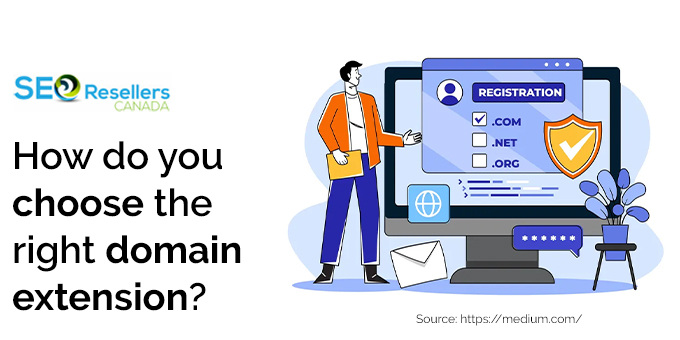
If financial resources permit, consider securing multiple ccTLDs related to your business. This proactive approach allows you to create a globally structured website seamlessly. By registering domain names with slight variations, you minimize the risk of clients encountering other businesses due to minor typos. This comprehensive strategy safeguards your brand and ensures your online traffic reaches the intended destination, enhancing lead generation efforts.
15- Conclusion
The decision between .ca and .com domains for small businesses is a game-changer. Align your choice with your target audience, business goals, and global aspirations. This way, you can enhance your online presence and achieve the desired outcomes effectively. Making the right decision ensures your business connects with the right audience. The right domain even makes the most out of the PPC management services you are investing in to stand out in the competitive online landscape.
Editor’s Note: This post was originally published on September 24, 2020, and has been completely revamped and updated for accuracy and comprehensiveness.

















